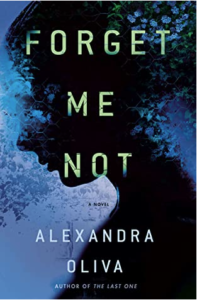A genre-bending novel, when done right, can really reshape the way we think about what’s possible both in fiction and in real life. Much like Sara Faring’s The Tenth Girl, this layered blend of literary genres has the reader reconsidering the processes of our everyday existence, what it takes to live in (or buck) the societies around us, and what we owe our parents in addition to ourselves (tho unlike in Ms Faring’s excellent debut novel, the parents of our protagonist here are unfortunately varying shades of awful.)
 Linda Russell was born to fill a hole left in the lives of her parents with the death of her older sister, Maddy. As is sadly the case with too many deaths of children, her parents’ marriage did not survive for very long after Maddy passed away. Lorelei, her mother, grew more and more obsessed with rebirthing her beloved girl. And so Linda was born, to be raised on a remote, walled-off estate, her only companions her mother and her twin sister, Emmer. One day, an incident occurs that has Linda fleeing the estate in a panic: when she returns to an empty house, she decides to strike out for help. Her arrival in the nearby town of Cedar Lake causes a hubbub, drawing unwanted media attention as questions swirl around who, and what, she really is.
Linda Russell was born to fill a hole left in the lives of her parents with the death of her older sister, Maddy. As is sadly the case with too many deaths of children, her parents’ marriage did not survive for very long after Maddy passed away. Lorelei, her mother, grew more and more obsessed with rebirthing her beloved girl. And so Linda was born, to be raised on a remote, walled-off estate, her only companions her mother and her twin sister, Emmer. One day, an incident occurs that has Linda fleeing the estate in a panic: when she returns to an empty house, she decides to strike out for help. Her arrival in the nearby town of Cedar Lake causes a hubbub, drawing unwanted media attention as questions swirl around who, and what, she really is.
Fast-forward almost two decades and Linda is living alone in a Seattle apartment building, listlessly following the health-maintaining instructions sent to her via her Sheath, the wearable smart device that’s a logical extrapolation from modern technology to a reasonable near-future conclusion. The media firestorm that surrounded her emergence into the modern world has left her shy of other people in general and of strangers in particular. So when a friendly extrovert moves in on her floor, Linda’s first instinct is to avoid her.
But Anvi Hendrickson is determined to make friends, and with the help of her dog Nibbler, soon works her way into Linda’s life. One day, she introduces Linda to the latest in Virtual Reality technology, getting her to try out a game called Fury And Honor. While immersed, Linda finally feels free of the strange-to-her expectations society has of a girl reared by an unwell mother, closed off from normal human contact for over a decade. Her interactions with other people in the game are straightforward: complete a quest for someone and they’ll reward you, without any subtext or ulterior motives (or not any that will irreversibly break her heart, anyway.) Linda finds herself playing for hours, until news filters through to her that her childhood home has burnt down under suspicious circumstances. Empowered by the agency she’s been able to display in VR, she decides to finally revisit the place that still haunts her dreams, setting in motion a chain of events that could threaten what little independence she has left, if not her very life.
Alexandra Oliva does a mind-bending job with this, her second novel, asking readers not only to question the very nature of reality but also to consider the ways our lives can be broken down into processes and routines — the very stuff of computer programming. As an avid augmented reality gamer, I’m unceasingly fascinated by the gamification of our everyday lives, including how relationships, as in The Sims, grow with nourishment or fade away from neglect. I love how Ms Oliva explores these topics while writing a really terrific, twisty lost-girl thriller that also touches on bioethics and privacy concerns, even as the near-future setting allows us a glimpse of hope into a post-pandemic world that feels refreshingly normal, if still occasionally messy.
This was a deeply satisfying novel with unusual but well-thought-out characters. Linda herself is a tour de force of imagination, a completely lived-in portrayal of a shy young woman with few social skills, struggling to survive in a society that demands connection. Of the supporting characters, it would have been easy to make her father either wholly a jerk or wholly a martyr, but the blend Ms Oliva comes up with strikes the perfect balance, depicting a flawed human being doing the best he can despite the handicap of a large streak of narcissism. In fact, Ms Oliva’s overall approach to characterization here is exceptionally compassionate: people make bad choices out of fear, or love, or selfishness but no one chooses to be malicious for its own sake, and that’s honestly quite nice to read. People are, by and large, rational creatures, and seeing that reflected in these pages really grounds the heady, lofty ideas in a realism that makes them not only easier to understand but also to relate to.
Forget Me Not by Alexandra Oliva was published March 2, 2021 by Ballantine Books and is available from all good booksellers, including
Want it now? For the Kindle version, click here.
